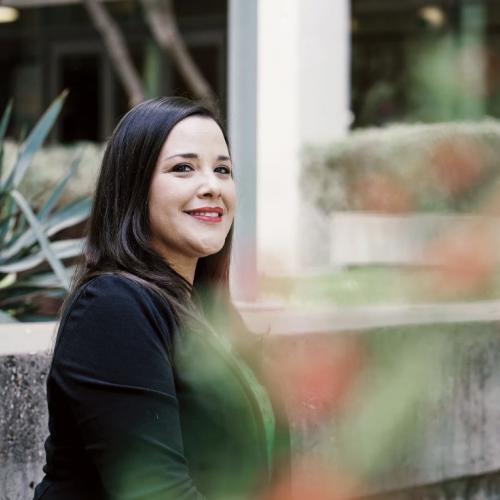Graduate Program Requirements, Evaluation and Advising
Our graduate program accepts students with a proven record of accomplishment and a dedication to future success. As a student-tailored program, you will develop a plan of study in consultation with anadvisory committee of your choosing. We have high expectations of our students and are here to support you every step of the way.
The Graduate Studies Committee (GSC) develops, updates and maintains the rules, policies and degree requirements for the graduate program in Communication Studies. This information is available to students via the Graduate Student Handbook which is updated yearly and posted here for reference.
Graduate students must abide by the rules, policies and degree requirements established at the time of their first semester in the program.
Our graduate program is student-tailored. Students develop a plan of study in consultation with advisory committees of their choosing. Ordinarily, an M.A. program is complete in 2 years, a Ph.D. in 4 years Students who complete an M.A. program in the department and would like to continue at UT-Austin must apply through the department for admission into the Ph.D. program. As the quality of the dissertation may be jeopardized when it is completed out of residence, and the increasing specialization within the various areas of communication, we encourage most students in the doctoral program to create a 4 year Ph.D. work plan.
Goal of the degree
The doctoral program in Communication Studies at the University of Texas is devoted to increasing understanding of the processes and effects of communication. The goal of the doctoral program is to prepare students to conduct original research extending human knowledge in one of these areas: Interpersonal Communication, Organizational Communication, Rhetoric, Language & Political Studies.
Expectations and Student Responsibilities
The Doctoral degree is seen by faculty members as a research degree; completion of the doctoral program assumes a willingness and capacity on the part of students to conduct original research in a chosen area, and a receptivity to a well-rounded education in Communication Studies. The Department's philosophy is to produce specialists in Communication Studies who:
- have a broad understanding of their discipline
- can contribute importantly to scholarly dialogues with their colleagues in the discipline
- articulate the tenets of their discipline throughout the academic community
- are capable of imparting and applying their insights to the public through teaching and service.
Before the doctoral degree is awarded, students are expected to:
- achieve mastery of a body of literature pertinent to the student's major area of interest and necessary supportive area,
- obtain proficiency in a research methodology appropriate to the focus of the student's research program,
- acquire basic teaching skills necessary to teach courses in the student's major area of interest,
- demonstrate a minimum understanding of at least one other area in Communication Studies outside of the student's individual academic concentration.
- degree requirements and enrolling in courses that fit their degree program.
- University regulations concerning the standard of work required for continuance in the Graduate School
- University and departmental regulations of employment as a TA or AI.
Regulations
No more than 20 percent of the hours on the Program of Work for a master's degree may be taken on the credit/no credit basis, and no more than a comparable portion of the Program of Work for the doctoral degree. No CMS courses may be taken Credit/No Credit unless that is the only way they are offered.
Courses for which the symbol X (incomplete) or I (permanent incomplete) is recorded may not be included on the Program of Work. The student has one long semester to change an incomplete into a letter/credit/no credit grade. This change must be reported prior to the last class day of the following long semester.
Procedures for adding and dropping courses are outlined in the Course Schedule.
All Communication Studies courses on a work program should be at the graduate level. Out-of-the-department undergraduate courses may be included in the supporting work of a masters' student with the approval of the student's Supervisor and the Graduate Advisor.
A maximum of 6 graduate hours may be transferred for the M.A. or Ph.D. degree. A student must have a special reason for requesting transfer of graduate credit and must submit a written petition to the Graduate Advisor. Attached to this written petition should be a copy of the transcript showing the grade obtained in the course being petitioned, and a copy of the page in the graduate catalogue which furnishes a description of the course. The petition ultimately must be approved by the Dean of the Graduate School.
Auditing may be done only with the consent of the instructor of the course.
Advising
All Communication Studies graduate students are individually advised by a faculty member in their area of study. Faculty advisors guide students through the selection of their courses every semester. In addition, they help students prepare for comprehensive exams (doctoral), and guide students in the preparation of the thesis (masters) or the dissertation (doctoral).
Time Limits
All requirements for a master's degree must be completed within one six-year period. Work over six years old can be reinstated only with the permission of the graduate dean, upon recommendation of the Graduate Studies Committee.
All completed work that is included in a doctoral student's degree program at the time of admission to candidacy must have been taken within the previous six years (exclusive of a maximum of three years of military service). The Graduate Studies Committee will review the program of students who have not completed the degree at the end of three years from admission to candidacy; the committee will review the status of the student's program yearly thereafter. At those times, the committee may recommend additional coursework, further examinations, or termination of candidacy. In addition, the program is subject to review by the graduate dean.
Degree requirements may be changed from one catalog to the next. The student is normally bound by the requirements of the catalog in force at the time of his or her first registration; the student may choose, however, to fulfill the requirements of a subsequent catalog. If the student does not fulfill the requirements within six years of his or her first enrollment in the Graduate School, he or she is then bound by the requirements of a subsequent catalog. The student may choose the catalog in effect in any year in which he or she is enrolled in the Graduate School, within the six-year limit.
Ordinarily, students must be registered for the semester in which they graduate and must apply for graduation by the deadline published in the academic calendar. There are no exceptions to this policy for fall semester and spring semester graduation; if students complete all degree requirements but miss the deadline for acceptance of the thesis, report, dissertation, or treatise, then they must register and pay tuition and fees the following semester or summer session in order to receive the degree. An exception is made for students who apply to graduate in the summer session but miss the deadline for acceptance of the thesis, report, dissertation, or treatise. In this case, the student will be registered in absentia for the fall semester, only for the purpose of receiving the degree, by degree evaluators in the Office of Graduate Studies. The thesis, report, dissertation, or treatise must be accepted by the deadline for in absentia registration, which falls the day before the beginning of the following fall semester. The fee for in absentia registration is $25. The student will be registered in absentia only once.
Advising Details
The faculty gather annually every spring semester as the Graduate Studies Committee (GSC) to review the progress of each student in the program. Students are informed of their progress by the Chair of the Graduate Studies Committee via letter. A copy of the letter is also placed in the student's file in the Graduate Coordinator's Office.
Students must maintain, within the overall grade-point average, a 3.0 average for all upper-division and graduate courses in their major area and minor fields of study
The faculty of each program annually review the progress of each student in the program. The review usually takes place during the Spring semester. Students are informed of their progress by the Chair of the Graduate Studies Committee. A copy of the letter is also placed in the student's file in the Graduate Coordinator's Office.
The types of recommendations made from the evaluation are:
- that the student be continued in her/his program.
- that s/he be put on probationary status. The procedure for being removed from probation is set forth in the evaluation letter.
- that her/his program is to be terminated. The student may appeal this decision by writing a letter to the student's advisor and to the graduate advisor with details of how the student will correct the reasons for termination.
The Graduate Studies Committee (GSC) includes all assistant, associate, and full professors who are active in the program. Committee members review applicants' credentials, make admissions recommendations, and serve on master's thesis/report and doctoral dissertation committees. In addition, each students progress is reviewed annually by the GSC, and students' work programs and thesis/dissertation proposals are subject to the GSC's approval.
The department Graduate Advisor is a faculty member elected to chair the GSC and take the lead on all matters pertaining to graduate program's policies and procedures. Duties include:
- Represents the Vice President, Dean of Graduate Studies, and the Graduate Studies Committee in all matters pertaining to the advising of graduate students taking major coursework in Communication Studies
- Refers students to the Vice President and Dean of Graduate Studies for exceptions requiring their action.
- Acts as the representative of the Vice President and Dean of Graduate Studies in all matters that may be assigned.
- Provides information to those who inquire about graduate programs in Communication Studies.
- Assists the graduate faculty in selecting students for admission.
- Provides students and faculty with information about the policies and procedures of The University, Graduate School, and Departments that govern graduate programs.
- Counsels students who are having academic problems.
- Chairs Graduate Studies Committee.
The Graduate Program Coordinator provides administrative support to the Graduate Advisor and the department regarding any and all policies and procedures for the graduate program. Duties include:
- Provides information to those who inquire about graduate programs in Communication Studies.
- Assists students in applying for admission.
- Assists the graduate faculty in selecting students for admission.
- Assists in the supervision of orientation and registration of graduate students.
- Checks registration on each graduate student and acts on adds, drops, and section changes.
- Maintains a record of each student's work of previous degrees, as well as copies of registration and grades in work done at The University of Texas at Austin
- Informs current and prospective students about graduate work and refers students in appropriate instances to other faculty members for advice.
- Assists students in applying for financial aid: fellowships, research, professional development awards, etc.
- Provides students and faculty with information about the policies and procedures of The University, Graduate School, and Departments that govern graduate programs.
- Counsels students who are having academic problems.
- Assists the graduate faculty in its annual evaluation of students.
- Reports periodically to the Graduate Dean and the graduate faculty of the Department about graduate programs, their size, the academic characteristics of the students, etc.
Contacts

René Dailey


